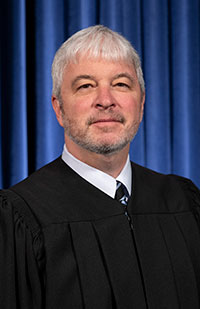Justice Donnelly Spotlighted in New Book on Plea Deals

Justice Michael Donnelly’s views and experiences with plea deals are part of a new book that details issues with the practice and how it can be reformed.

Justice Michael Donnelly’s views and experiences with plea deals are part of a new book that details issues with the practice and how it can be reformed.
The criminal sentencing reform views of Ohio Supreme Court Justice Michael Donnelly are featured in a new book that examines systemic issues with the most common resolution in criminal cases – plea deals.
“Punishment Without Trial: Why Plea Bargaining Is a Bad Deal” by law Professor Carissa Byrne Hessick analyzes how the overwhelming majority of criminal cases conclude without a jury, and why advocates see this pattern as undermining justice across socioeconomic and racial divides.
Scholars estimate up to 95% of federal and state court criminal cases end in plea arrangements.
“The process remains mostly a mystery to the citizens that we serve,” Justice Donnelly said. “The book basically lifts that shroud about the unsavory and coercive nature of the proceedings.”
Justice Donnelly and Hessick are scheduled to participate in a public forum about plea bargaining and criminal justice reform at Ohio State University Moritz College of Law on Feb. 16, 2022.
Hessick is a law professor at the University of North Carolina School of Law and directs the school’s Prosecutors and Politics Project to increase awareness about prosecutions and criminal justice issues.
The latter portion of her book details Justice Donnelly’s “career epiphany” about plea settlements and how frequently deals are made off the record. Since then, Justice Donnelly has advocated for all criminal proceedings to be documented in open court.
Plea bargaining dates to the 17th century during the Salem witch trials and slowly gained more acceptance in the late-19th century through the Prohibition era in 1933. In 1971, the U.S. Supreme Court deemed plea deals constitutional, leading to the current norm of resolving cases without juries.
“[Plea bargaining] forces the hand of lawyers, judges, and defendants, turning our legal system into a ruthlessly efficient mass incarceration machine that is dogging our jails and punishing citizens because it’s the path of least resistance,” Hessick said.
Through that project and her book, Hessick illustrates how difficult it is for defendants – guilty or not – to decline a plea deal. It’s a sentiment Justice Donnelly echoed during his contributions in a chapter that probes the inconsistencies in truth and fairness.
Earlier this year, Justice Donnelly similarly voiced the odds against defendants regarding plea arraignments in a law article, “Sentencing by Ambush: An Insider’s Perspective on Plea Bargaining Reform.” He writes that prosecutors can charge multiple and different offenses based on the facts from a single event as a means of leverage against a defendant, and that not all plea negotiations are on the record.
Problems with criminal sentencing date back decades. As more examples have been gathered by those seeking reform, more ideas for change have risen.
One proposed way to evaluate the plea bargain situation is the establishment of criminal sentencing databases. The Ohio Criminal Sentencing Commission and the Ohio Supreme Court is working to establish a statewide database that would include plea statistics.
“The justice system has drifted from what our founders intended, where you're innocent until you're proven guilty beyond a reasonable doubt,” Justice Donnelly said. “I hope the solutions we offer will help restore truth and transparency as the primary objective of the process.”


